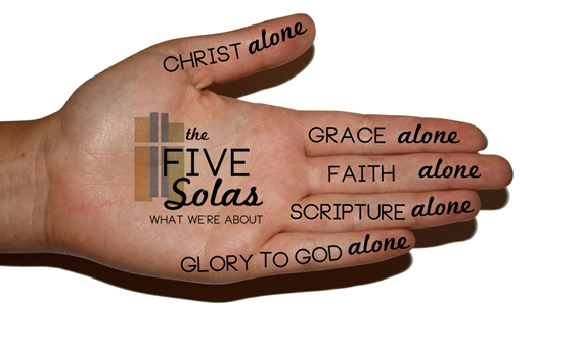A brief explanation of the five solas of Protestantism.

Protestants are not Roman Catholics. Roman Catholics are not Protestants.
Although they may be agreed upon certain key tenets of the Christian faith, there is one little term that separates them time and time again, namely, the word ‘alone’.
Like Protestants, Catholics believe in the authority of Scripture, the importance of grace, the excellence of Christ, the need for faith and the worship of God. But unlike Protestants, Catholics never speak of Scripture alone, grace alone, faith alone, Christ alone or glory to God alone.
Today we are going to take a look at what have gone done in history as the five ‘solas’ of the Protestant Reformation. It is really this theological quintuplet that draws the sharpest dividing line between Wittenberg and the Vatican.
1. Scripture Alone
Protestants confess faith in ‘Sola Scriptura’, that is, Scripture alone. This doctrine, which was the material principle of the Reformation, teaches that the supreme rule of faith and practice is the Word of God. It should be pointed out that ‘Sola Scriptura’ is not the same as ‘Nuda Scriptura’ i.e. the idea that Christian should only read the Bible. Not only are there a lot of useful Creeds in church history –the Nicene Creed, the Chalcedon Creed and the Apostles’ Creed come to mind- but there are some great Confessions of Faith as well and a whole wad of fabulous books written by wonderful servants of God that help us advance in our Christian life.
Scripture alone, then, does not rule out other minor authorities, but it does make sure they never usurp the teaching of the Bible. In this sense Protestants are in deep disagreement with Catholicism as the Roman theological system puts Church Tradition alongside Scripture as an equally authoritative source of revelation.
2. Grace Alone
The second ‘sola’ of Protestant faith has to do with grace alone which means that salvation is entirely of the Lord God Almighty. This doctrine dispels the Roman myth that salvation is a synergistic affair in which man gets some of the credit for deciding to cooperate with the bountiful grace of God. In Protestantism, the only Saviour is God Himself. Thus man can never get to boast in himself or in his merit. As the great Protestant hymn writer Augustus Toplady (1740-78) put it: “Thou must save and Thou alone”. Or as John Newton famously (1725-1807) penned: “Amazing grace, how sweet the sound, that saved a wretch like me”.
3. Faith Alone
Faith alone –the third ‘sola’ of Protestantism- was the material principle of the Reformation. It was the blessed truth that God imputes His righteousness to sinful human beings by faith alone that transformed Martin Luther’s (1483-1546) mourning into joy. Justified by faith alone! No longer was salvation a matter of human merit, works, righteousness or penitence as in Catholicism but a precious gift of God bestowed via the channel of faith. As Luther wrote in his Heidelberg Disputation (1518), “The Law says ‘Do this’ and it is never done. Grace says ‘Believe in this’ and everything is already done”.
Faith, however, was never the grounds of Protestant salvation; it was only the means by which salvation was applied by God and appropriated by the sinner. Upon believing the Good News of Christ, believers find themselves entirely justified before God because the perfect righteousness of the Son of God is put into their account. God no longer sees them in Adam but in Christ.
4. Christ Alone
Protestantism’s fourth ‘sola’ –Christ alone- deals with the real root of salvation. The reason that sinners could be justified by faith alone was because the perfect righteousness of Christ was applied to their account and their sins were likewise put upon the Lord. This is what Protestant Dogmatics refers to as the doctrine of double imputation (2 Corinthians 5:21).
So Christ’s work was not just a matter of taking His people’s sins away, but it was also about Him putting positive righteousness into the account of believers so that they could inherit the Kingdom of God. How could Christ achieve such a feat? By His perfect work of atonement carried out from His incarnation onwards, culminating in His death, burial, resurrection and ascension to glory. Even in this present moment, it is Christ’s ongoing intercession for His saints that guarantees their final perseverance in the faith. This is why Protestantism has always criticized the doctrine of Purgatory as such a doctrine negates the impeccable priestly work of Christ.
5. Glory to God Alone
Since salvation is entirely of the Lord –by grace alone through faith alone in Christ alone- the logical outworking of the Protestant confession is summed up in the phrase: “Glory to God Alone!” Only God saves therefore to Him alone be all the glory. How else could Protestants react to the glad tidings of the Gospel?
This motto stimulated has stimulated waves of godly servants over the centuries to live for the glory of God alone and to preach His Gospel to the four corners of the Earth in spite of horrific persecution. Protestants bow down to no worldly prince because the King of heaven their only sovereign One.
Conclusion
May these blessed five evangelical ‘solas’ have free course throughout Europe and the rest of the world in our generation! Scripture alone! Grace alone! Faith alone! Christ alone! Glory to God alone!

Las opiniones vertidas por nuestros colaboradores se realizan a nivel personal, pudiendo coincidir o no con la postura de la dirección de Protestante Digital.
Si quieres comentar o